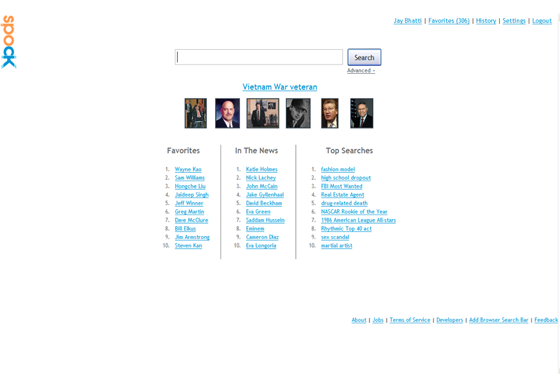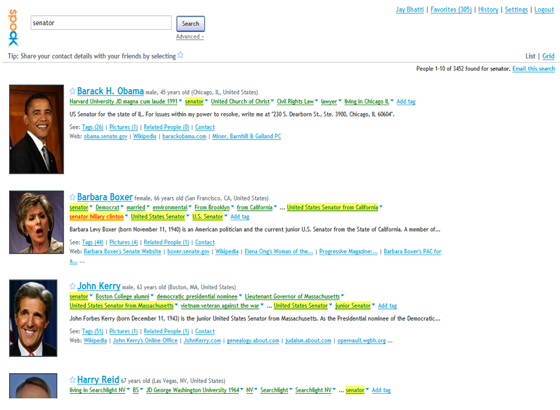It’s not often we hear about a startup’s venture financing before we see the product, but that is the case with yet-to-launch Spock, located in Silicon Valley. Rumors about their $7 million Series A round of financing from Clearstone Venture Partners and Opus Capital Ventures circulated last December, months before the beta service was planned to launch.
I met with founders Jaideep Singh (CEO) and Jay Bhatti (VP Product) last week to test the service, which they plan to beta launch next week.
People search is a space that went from nowhere to crowded, fast. Wink changed direction and launched a people search product last November. Also in this space is Streakr (yet to launch), ProfileLinker, LinkedIn, ZoomInfo and Upscoop.
Spock’s People Search Engine
Unlike the others (for the most part), Spock goes way beyond searching just social networks for people information. They are positioning themselves specifically against Google for web search and Amazon for product search, saying the third important type of search is information about people, and that 30% of Internet searches are people-related. Wink is Spock’s closest competitor among all of the ones listed above.
In my testing, Spock did a great job of finding information about different kinds of people – bloggers, celebrities, and even lesser known individuals with some web presence. See last screenshot below for an example search results page.
People Profiles and Metadata
But part of where Spock really shines is what they do after the search is completed. They are slowly indexing the entire web , which is no small feat, but focusing on important hubs of people information like blogs, wikipedia, photo sites and, of course, social networks. Each person discovered by their search engine is run through a process of de-duping (for people with identical or similar names) and given a permanent profile page (see screenshot of former President Bill Clinton’s profile to right – click for larger view). Spock auto-creates tags for individuals based on the information they find. Prominent tags for Bill Clinton, for example, include “former U.S. President, “Great Leader,” “Womanizer,” “Left Handed,” “Democrat,” and “Saxophonist,” among others. Spock also auto detects other relevant meta data about the individual – age, location and sex.
Users can add new tags and vote on whether existing tags are relevant or correct. Also, individuals can claim their own profile (Spock runs your email through the social networks to see if it is attached to the right profile). Once claimed, that user has additional voting weight with his or her own tags and description. It will be interesting to see prominent individuals fighting the masses as they try to dominate their own identity, and lawsuits will inevitably surface as well.
People Relationships
Spock also finds relationships between people based on an analysis of information obtained in their web index, and based on user added data later on. When looking at a person’s profile, there will be links to others that Spock thinks are related.
Matt Mashall got a very early look at the product last year. See his notes here to see how it has changed since then.

